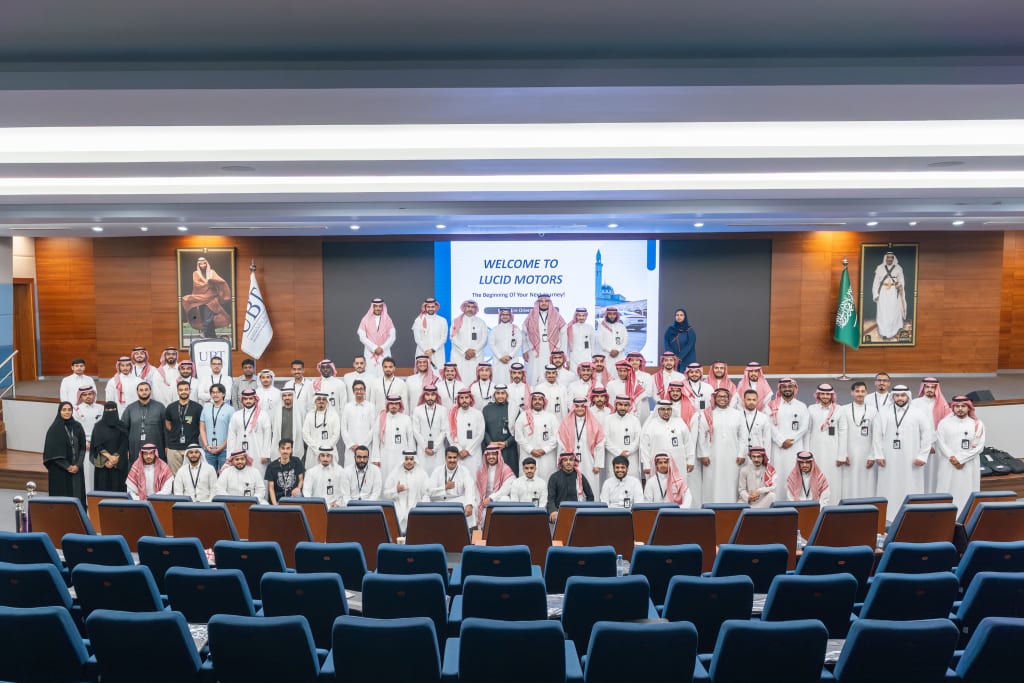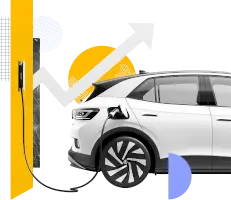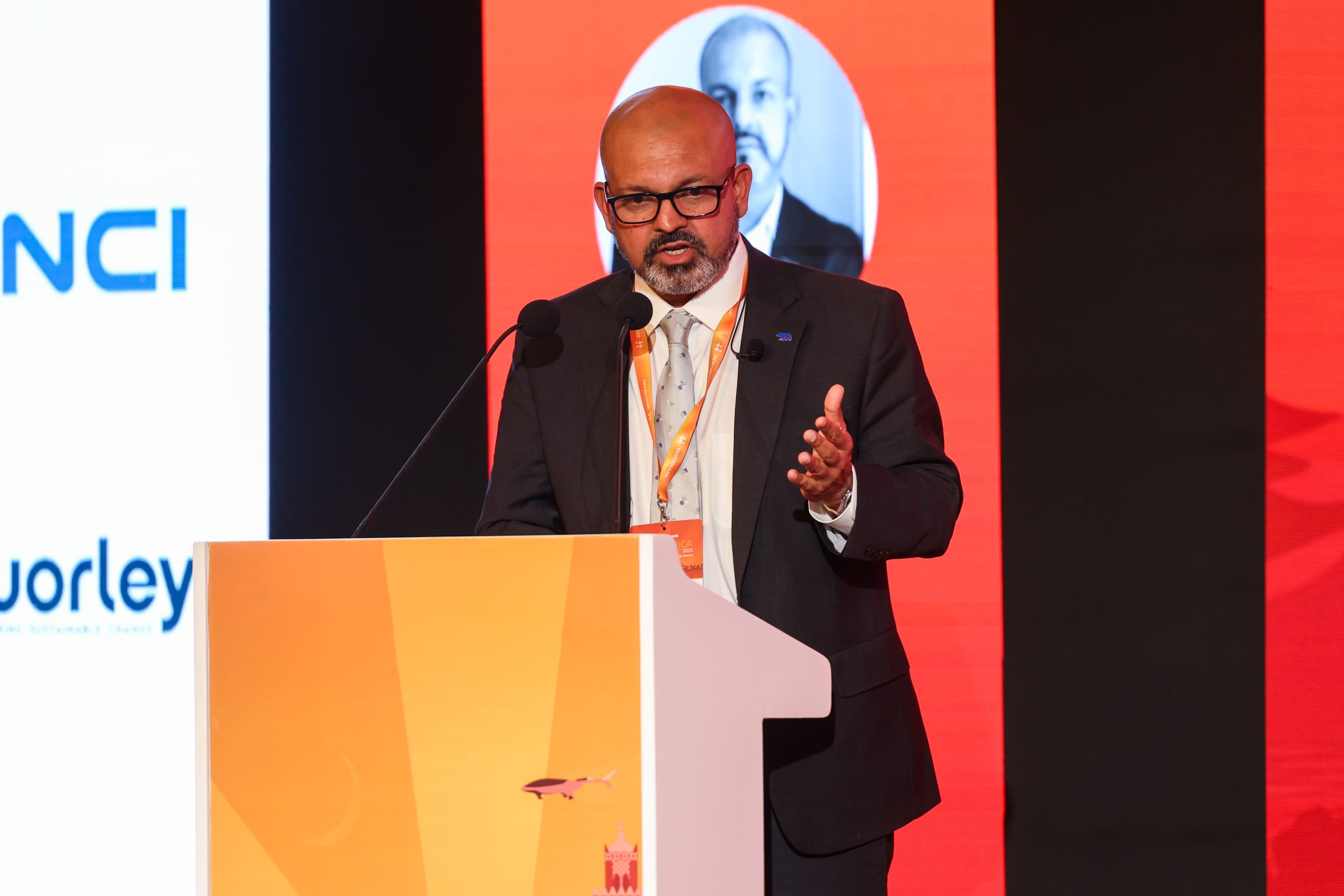Luxury electric vehicle developer, Lucid Motors is headquartered in California but is majority funded by the Saudi Arabian sovereign wealth fund, Public Investment Fund (PIF).
The company completed construction of its first manufacturing facility, AMP-1, in Arizona, US in December 2020 and opened a second, knock-down kit facility (AMP-2) in Saudi Arabia in September 2023.
Currently Lucid targets the luxury market, with its Lucid Air EV selling from $70,900 and newly launched SUV, Lucid Gravity from $79,900. However, the company is looking to break into the mid-range market with a midsize SUV to be assembled in Saudi Arabia.
Benchmark’s Automotive Research Lead, Will Roberts, sat down with Lucid’s President of Middle East Faisal Sultan at the sidelines of Giga Africa 2025 in Morocco to discuss the company’s progress in the Middle East, as well as developments for EVs in the region.

Benchmark: How do you see the EV market evolving in the Middle East and what role is Lucid in particular playing in driving adoption?
Faisal Sultan: Overall in GCC [Gulf cooperation council] and MENA [Middle East and North Africa] combined, I think, it is going to grow, as I said in my presentation, to at least 20%, 25% Market share. The gap between now and what has been announced for 2030 in the majority of the countries like Saudi Arabia and UAE is tremendous. So we’re starting off from nothing really. Lucid is doing a pretty good job in the Kingdom, which itself is now putting forward policies to really get to those types of numbers. We’re talking 200,000 to 250,000 new car sales, that’s a lot, right?
So how is that going to happen? So, you know, the Kingdom has already started to put plans together – where it is basically looking to invest $50 billion – that are dedicated towards the EV ecosystem. So what that will entail first of all is the production of cars. Lucid is already there, and there are a couple of other OEMs that have started building their plants. That’s 300+ thousand of yearly production. So the supply definitely is not going to be the constraint.
Next, the infrastructure is where there’s going to be a lot of spending. We give home chargers to our consumers, they install it where they have a dedicated parking spot, which most of our customers do with our current product offering, the Lucid Air, which is a premium sedan. With the Lucid Gravity, I think that will remain the same.
When we get into the midsize, which we’re going to roll out at the end of next year, beginning of 2027, public infrastructure is going to start to play more of a role. And I think EVIQ, which is the electric vehicle infrastructure company in Saudi, is going to invest a lot of money in charging. They’re going to have about 5,000 fast chargers all across the country. I think that will really help.
And I also think it’s just consumer awareness. We were trying to really put a lot of effort in our marketing to really get the consumers eased up to the thought of owning an EV, having a product that is not compromising anything. You have the range, you have the performance, you have the luxury, you have the ownership experience. That is much better than an ICE offering.
So that’s our role from our side. I see a lot of progress, and that’s going to continue now – let’s say the 30% target becomes a reality, or they only achieve 20%, that is still going to be an amazing feat.
Walk us through a bit what’s happened in those last two years of AMP-2.
FS: We always knew it would be a partnership, a public private partnership, to get something like this started. A first ever plant, purpose-built for EVs, you know for any passenger vehicle plant and especially to be an EV plant in the kingdom, you need help.
So, to list a few; PIF – Public Investment Fund – who’s our biggest shareholder, Ministry of Investment, Ministry of Industry, SIDF [Saudi Industrial Development Fund], ECZA which is the governing body of the economic zone that we are in, King Abdullah Economic City, King Abdullah University of Science and Technology. The list is so huge, right? They all came together and that’s the beauty of being in Saudi Arabia when you know it is being driven by the Vision 2030.
All of these private and public entities are willing to help, and we got enormous help on this from incentives, from regulations, from policies that will, and that are enabling us right now.
We are already producing cars. All of our cars that get assembled and sold in the Kingdom are assembled at King Abdullah Economic City M2 plant. We are also now exporting to the UAE, so that’s a proud moment. I think we were one year, one month into the production when we started to export. That was a big badge on our collar – basically saying we are a Saudi-made product that’s now exported.
So we started very small, we started with an SKD assembly facility for a reason. Because we wanted to use that facility to attract the supply chain, let them know that we are here. You know, we are here, we have a workforce, we have kits coming in, we have quality metrics. Look at this. We’re producing amazing cars. They’re as good as our US produced cars.
All of that was in our mind, and then as we were doing that immediately from the inauguration for the SKD plant, we had already started on the CBU [Complete Build Unit] buildings. So, the complete-build-unit buildings are ahead of time right now. It’s ahead of schedule.
We have already started training people at the National Automobile Vehicle Academy [NAVA] which again we opened with the help of the Saudi entities, PIF, Ministry of Education, Ministry of Transport all coming together. So that academy is already training people and that has been available to us starting in January of this year [2025].
It’s wonderful to see the progress of the assembly plant itself and then now very eagerly anticipating launching the CBU plant for the midsize.

So where does it go from here? How do you develop into the CBU plant?
FS: Yeah, I think as I said on supply chain and human capital, we’ve got programs going on, and on demand some of the policies that are coming will help take care of that. Of course, we are going to produce a plant that’s going to have a capacity of 150,000 vehicles. So, most of that capacity is going to actually be utilised outside of GCC. So even, exporting product to Europe, Asia and Africa, wherever the demand is there for midsize, we will be exporting it from this plant.
So we will need thousands of people, we’ll have to continue to keep on training people. You know, through NAVA, through HRDF – Human Resource Development Fund – which has already given us $50 million to train Saudi nationals. So, we’ve actually started, about three or four batches have gone to Arizona and California, got trained and came back.
That’s really going to work in our favour now. I think what we are doing is really focusing on the supply chain. We have about two or three contracts that have been signed that will be localised right next to our plant. And, we will continue to build on them in the next few years to continuously add supplier by supplier by supplier, so that we are competitive in our pricing to send this product to the world.
What role do you think Lucid will play in supporting development of the automotive and battery electric vehicle ecosystem in Saudi Arabia and the wider area too?
FS: Well, I think for EVs and in Saudi Arabia, for getting an electric vehicle industry, or even general car manufacturing started, we are playing the key role.
We’re the first manufacturer already and we are the first exporter. And with that comes a lot of responsibility. We are basically defining a lot of the policies. We’re working with the policymakers to tell them, look, this is what’s really needed on the consumer side, this is what’s really needed on the OEM side, and this is what’s really needed on the supply side so that we can have a sustainable industry.
We really are giving advice that it can’t be tariff based, where you’re protecting the industry artificially. We want to be competitive. You have a small tariff ceiling in Saudi Arabia, it’s 5%, so all the product that comes into Saudi Arabia is coming in currently at 5%. Therefore, it’s going to be very hard for the local manufacturers to compete.
We’re basically telling them to give us the incentives in the right bucket, so the policies should really be focused on the productivity of the human labour so that they are trained to be competing with the best of the best. The benchmarks are coming out of, let’s say Thailand or China or Turkey, or here in Morocco, and they need to be able to compete with that.
The quality of the product has to be good, right from the beginning. There has to be financing available, there has to be consumer side energy cost support. Things like that, for OEM and then supply chain and for consumers, all three.
All of this will really help us to stay competitive right from the beginning, and not to have some artificial protection on top of us. So, we’ll continue to work with these goals in mind, and I think in the region, we will play that role too. We are in the UAE, we’re targeting being in two more GCC countries next year. So, as we expand our organisation into new countries that have no EV population or car parc, we will really need to help the policymakers.

Where are you seeing demand emerge for Lucid at the moment and which customer segments in particular are showing interest?
FS: Well, in the region Saudi is our biggest market of course. In the GCC they are 60, 62% of the total market and I think right now they’re leading the electric vehicle progress.
I know UAE started very strong but it kind of slowed down. But I think Saudi’s investment into Lucid really brought this EV revolution up on the radar for people. People know EVs, as Lucid Corporation we have our highest awareness in Saudi Arabia. And that’s because people know what an electric vehicle is, what a Lucid is.
We’re seeing a lot of fleet orders, we’re seeing a lot of conversions from performance-based cars into an electric based Lucid. So I think the segment will grow as we bring more product. I think the Gravity is definitely going to give us more total addressable market.
The [Lucid] Gravity market is about four times the total addressable market of Lucid Air sedan, which is a very small market. And then we have the midsize coming which will be another few tenfolds. So, I think that’s where the demand is going to come from. We want our retail footprint to increase in the region as we operate a little bit differently.
We’re direct-to-consumer in both KSA and UAE. In other GCC countries we’re probably going to be slightly different, more of an agency model perhaps. That is going to help us to expand quickly in the smaller markets. I think it’s going to be around 60 plus percent from Saudi and 20% from UAE and then the rest elsewhere, before eventually we will start expanding into other areas like Morocco. We’ll consider these markets later on once we have our stronghold in core regions.
Any final thoughts and messages to convey from the Lucid side?
FS: Well, I think there’s great transformation happening in Saudi Arabia and particularly in the region, just as we looked at today’s presentations here in Morocco also. So, I believe there are great opportunities for international companies, and I think Morocco’s ecosystem for automotive actually is a prime example of how to do it right.
I think there are companies that can take on the opportunity and then come and help out in the transformation in Saudi and we’d welcome to talk to them.
Learn more about the Middle East and North Africa region’s growing role in the clean energy transition by reading Benchmark’s free Beyond Oil special issue.
For full access to our news and insights, log in to our Membership Platform



 Back to News
Back to News